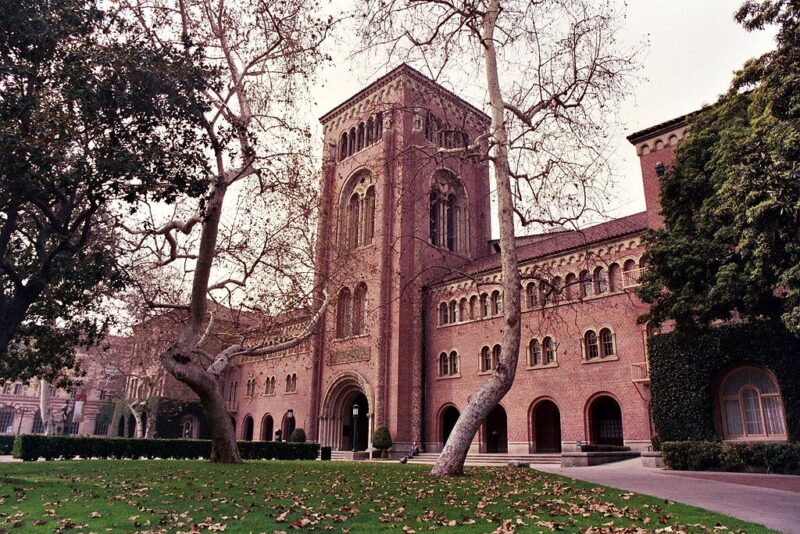A university is an incubator of diverse ideas and a bastion of intellectual freedom. It most certainly is not an institution that discourages or downplays the valued give-and-take of lively debate.
If this is an acceptable or reasonable definition of a university’s role in modern society, then the University of Southern California in Los Angeles has failed an important test.

The newly-elected vice-president of its Undergraduate Student Government, Rose Ritch, resigned from her position under duress on August 5 after she was subjected to an aggressive and ugly social media campaign ludicrously claiming that her support for Israel made her complicit in racism.
Understandably upset at being unfairly branded as a racist, Ritch, in an open letter, wrote, “This is antisemitism, and cannot be tolerated at a university that proclaims to ‘nurture an environment of mutual respect and tolerance.”‘
Stephen Smith, the executive director of the university’s Shoah Foundation, an adjunct professor of religion and a friend of Ritch, cut to the core when he charged that the attacks against her reflected “pure blind hatred and ignorance.”
Ritch, a Jewish senior from San Francisco, wrote that a “group of students” had accused her of being “unsuitable” as a student leader and had “harassed and pressured” her to step down due to her self-identification as a Zionist.
Ritch submitted her resignation after Undergraduate Student Government president Truman Fritz resigned after facing the prospect of impeachment over his alleged insensitivity toward African-American students.

In her letter, she expressed gratitude to the university’s vice-president for student affairs, Winston Crisp, for having suspended her impeachment trial, which had been scheduled to take place on July 14. He concluded that the case against her was “insufficient to ensure integrity” of the process.
Ritch, however, criticized the university administration for not having recognized the need to stand in solidarity with Jewish students on campus who are supporters of Israel.

She acknowledged she could have fought her adversaries, principally the Students for Justice in Palestine, which had called for her dismissal. But she opted for resignation as “the only sustainable choice to protect my physical safety … and my mental health.”
At the end of the day, Ritch was forced out of office because her pro-Israel stance was at odds with pro-Palestinian students and their supporters and sympathizers, who reject the very notion of diversity of opinion and endorse the Boycott, Divestment and Sanctions (BDS) movement against Israel.
“The sad reality is that my story is not uncommon on college campuses,” she wrote. “Across the country, Zionist students are being asked to disavow their identities or beliefs to enter many spaces on their campuses. My Zionism should not and cannot disqualify me from being a leader on campus, nor should others presume what that means about my position on social justice issues.”
“An attack on my Zionist identity is an attack on my Jewish identity,” she noted. “The suggestion that my support for a Jewish homeland would make me unfit for office or would justify my impeachment plays into the oldest stereotypes of Jews, including accusations of dual loyalty and holding all Jews responsible for the actions of the Israel government.”
Alluding to the current constrictive atmosphere at the university, Ritch said “there is a disturbing lack of nuance or willingness to grapple with the messy complexities of an issue … Students made presumptions about my Zionist identity and leapt to unfair conclusions. No one asked to to explain my passion for Israel …”
She said she was made to feel “ashamed, invalidated and dehumanized because of whom I am.”
A day after Ritch’s resignation, the president of the university, Carol Folt, announced that “Stronger than Hate,” an initiative launched by the Shoah Foundation, would be launched to combat biases and stereotypes through exhibitions, workshops and programs.

“What happened to Rose Ritch is unacceptable, and we must all take up her challenge to do better,” Folt said in an email. “This initiative is designed to help foster a campus culture of connection and compassion that empowers us to listen, learn, heal, and dream together.”
Fine words, but they’re a little belated.
Folt could and should have intervened to assure that Ritch’s views would not be held against her. But lamentably enough, she remained silent as the practitioners of “cancel culture,” a new and disturbing phenomenon, ran rampant and blackballed Ritch.
The lesson to be learned from the Ritch affair is that university administrators must draw a line in the sand so as to always be ready to defend the principle and the practice of free speech on campus.
Anything less would be a grievous blow to the cherished values of democracy.
